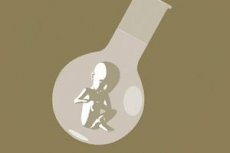Scientists have grown a human embryo in vitro
Last reviewed: 23.04.2024

All iLive content is medically reviewed or fact checked to ensure as much factual accuracy as possible.
We have strict sourcing guidelines and only link to reputable media sites, academic research institutions and, whenever possible, medically peer reviewed studies. Note that the numbers in parentheses ([1], [2], etc.) are clickable links to these studies.
If you feel that any of our content is inaccurate, out-of-date, or otherwise questionable, please select it and press Ctrl + Enter.

An international team of specialists from the United States and Great Britain in the laboratory grew a human embryo that remained alive for 13 days (earlier scientists managed to maintain life in the embryo for only 9 days). According to scientists, thanks to several additional days of life, they were able to identify new aspects of human development in the early stages, which previously remained unknown to science. Also, similar work can help in understanding why a number of pregnancies are interrupted in the first weeks.
Stages of development in the early stages of many animals by scientists have been fairly well studied, but human development in many ways remains unclear.
One of the specialists working in the new project, Ali Brivanlau, a biologist, noted that in the 21st century, scientists can tell more about rodents or frogs than about a man, despite the fact that in recent years a number of experts have worked in this direction and have already eliminated a number of gaps in this issue.
In particular, in the last work, scientists observed the division of cells in embryos and established a certain feature that can be called unique for humans.
Brivanlow and his colleagues found cells in the bud that appear about the 10th day, and disappear on the 12th. Now specialists can not explain what these cells are for and what they affect, but at the height of development these cells make up about 10% of the embryo. According to experts, cells can represent something like a transitional organ (such as a tail that appears in the embryo, but disappears before birth).
The study may be useful in the field of artificial insemination, for example, according to Norbert Glaicher, head of one of the reproductive centers in New York, about half of the embryos implanted in the womb die. The work of Brivanlow and his colleagues will help to understand to specialists what exactly is happening at this stage of development and how to prevent the death of the embryo after implantation.
Gleicher explained that the process of artificial insemination remains a mystery today, but now the findings of Brivanlou (with whom Gléjé cooperated in the past) will help to better assess the embryo's ability to live before direct implantation into the uterus.
Despite all the advantages of the new study, the ability to grow a human embryo in vitro evokes a number of ethical and political issues. In a number of countries, including the United States and Great Britain, embryos older than 14 days are prohibited, since the fetus begins to form after that time.
But during the work Brivanlou and his colleagues were almost sure that their embryos would not be able to live more than two weeks, since the embryo needs additional nutrition, as it grows, consisting of hormones and nutrients. To say which substances are required for a new organism during development, scientists now can not, for this it will be necessary to conduct another series of experiments with embryos of animals, to which, according to some information, scientists have already started.

 [
[